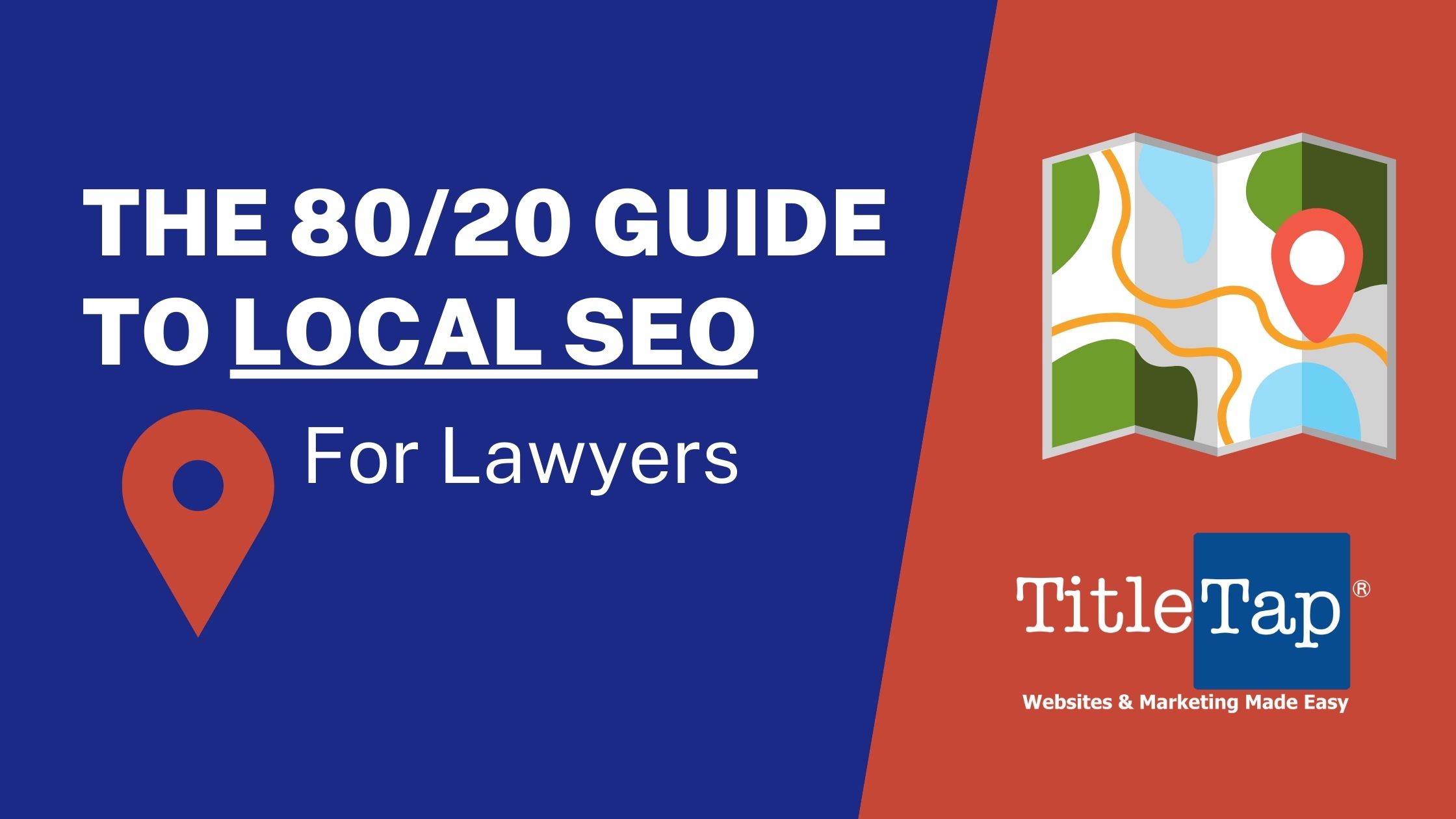What if your law firm could rank on page one of Google for your law firm practice area and the city you are based in? That’s where local SEO can play a pivotal role in helping prospects find your firm. Small law firms, in particular, can benefit from ranking high in their local search results.
In this guide, we’re sharing why local SEO is so important for lawyers to focus on, along with tactics to help you get started.
What is local SEO?
While general search engine optimization (SEO) practices are used to improve your law firm’s website for broader visibility on Google and other search engines, Local SEO uses this same approach, but for showing up in local search results—through Google and Google Maps. This helps when prospects are running searches for law firms nearby or searching through Google Maps.
For instance, this is how you can optimize your law firm to show up in searches like “bankruptcy lawyer near me” or “real estate attorney in San Antonio.”
Main local SEO benefits for lawyers
Here are a couple of the top benefits of local SEO.
- Outrank other nearby law firms: Chances are, you aren’t the only law firm in your practice area in your city. Investing in local SEO gives you an edge over other firms.
- Improve the quality of site traffic and leads: When you are targeting local, relevant keywords, this is going to lead to more visitors on your site that are qualified leads.
How to get started with local SEO
Local SEO isn’t a single step or one tactic. It’s a comprehensive strategy to improve your search ranking. Here are a few ways you can jumpstart your SEO marketing efforts.
Claim your Google My Business Profile
Google My Business is essentially your business’s official listing through the search engine. Think of it as the digital version of the Yellow Pages. By creating a free Google Business profile, you can claim your law firm’s listing as your own and add important details about your law firm.
Claiming your profile comes with benefits like the ability to get verified. This improves credibility and trust with searchers, improving the likelihood of them visiting your website. You also gain access to stats and insights like how many impressions and clicks the listing brought in.
Optimize your GMB profile
While Google may attempt to auto-fill the information into your profile based on your website, you should be proactive in managing your listing details. The best way to optimize your profile for SEO is to fill out all of the information completely and accurately.
For example, make sure the listing has your full, correct business name. Add your local phone number. A local number is a key indicator that you’re a legitimate local business. However, if you use a tracking number, add that in the first slot and your actual number in the secondary slot, so most of your leads will come through the tracking number.
Other details to pay attention to in your listing are your business hours, address, photos, and videos. Upload as many high-quality visuals as you can. Lastly, be sure to write a compelling description. You don’t need to add keywords here as they won’t affect your ranking. Instead, focus on your audience and write a description that helps them understand what your law firm is all about.
Build a process to get reviews for your GMB listing
Another aspect of Google My Business profiles is customer reviews. Positive reviews can help boost your visibility in local searches. They also give prospects a glimpse into what it’s like working with your law firm. Help control this part of the listing by creating a process for generating reviews.
For example, you probably have many satisfied clients that have used your legal services. How many of them have left a positive review for you online? Probably not many, but you likely haven’t asked them to either. One way to ask them is by developing a process where you send each client a thank you note shortly after you’ve finished working with them. In the note, reiterate how much you enjoyed working with them, include a link to your GMB listing, and ask them to leave an honest review.
You can also use a tool, like our software FeedbackAutomatic, to collect client feedback as well as automate this process of asking for these reviews.
Respond to reviews
Positive reviews are great, but unfortunately, they won’t all be 5-star reviews. No matter how great your legal services are. For instance, someone may feel slighted because you were unable to win their case or they felt ignored because they weren’t able to speak with their attorney on demand.
Having a plan in place for responding to reviews can help mitigate the damage from poor reviews as well as leverage the positive ones. The key is to see each review as an opportunity for a conversation and engage with all of your customers that took the time to post a review.
Here are some tips for responding to different types of reviews:
Positive reviews
- Respond quickly
- Express gratitude
- Use the reviewer’s first name in your reply
Negative reviews
- Respond quickly
- Apologize when appropriate
- Be transparent but professional about the situation
- Don’t get defensive.
- If needed, respond publicly and then take it offline to resolve the issue in private.
Whatever you do, don’t ignore your reviews. It’s a great way to build rapport with existing customers and make them feel valued. At the same time, it shows prospects how much you care about your clients and that you run a trustworthy business.
Claim your listing on other review sites
Google Business Profile (previously Google My Business) isn’t the only business profile out there. You’ll find several review sites across the web that can help with your search rankings. Claiming your listing on additional review sites, especially ones that cater to attorneys, means that your business is visible where your prospects are looking. It also lends credibility to your law firm because your profile can be found in multiple locations.
As with your Google listing, you’ll need to be accurate and detailed with each listing. Consider each of these platforms another touch point for your prospects and an opportunity to drive traffic to your site.
Findlaw, Avvo, Facebook, and Yelp all offer the chance to create a free business profile. Pay attention to the descriptions you write for each of these platforms to give your business presence a cohesive message across the different listings. For example, if free consultations are a key selling point, then you’ll want to be sure that it’s included in each of your profiles. Consistency in your listings will help improve credibility and trustworthiness.
Publish frequent blog posts or videos
This is the first step to content marketing. Pick a topic, news article, a recent change in policy and provide commentary on it.
If you don’t have time to do this yourself, check out our tool Socialite which can automatically aggregate and publish this kind of news to your blog or Facebook page.
Answer common industry questions on your website
The fact is, most prospective clients won’t find you by searching for your law firm’s name, but instead by Googling a legal question they might have like: “should I get a will?”, “who gets the children in a divorce?”, or “what documents do I need to start a business?”
Think about your practice areas and outline the common 3-5 questions that your clients ask you during consultations. Those are the seeds for the content you should consider adding to your website. Answer one question per page or topic.
This will help your website rank higher in search results.
Pro tip: Don’t have time to write your own content? Use our industry content marketing library instead to help you rank quicker.
Build links
Another method of local seo includes local link building which is the act of getting relevant backlinks to your law firm’s site. This could be the local chamber of commerce or another orgnaization you are part of. The goal is to help improve local search rankings. Fortunately, you don’t need as many links as you might think to have a sizable impact, so focus on quality over quantity.
There are several ways to build local links. For example, you can have your website added to local business directories. Reach out to your local press for coverage of your business. Local sponsorships can also help by including a link to your website on their page.
Lastly, do a regular audit of the existing links on your website. Websites change over time, so you may have links pointing to non-existent pages. Simply replace broken links with the updated URLs to recover the lost links.
As you can see, there is no single approach to local SEO. It’s a combination of different tactics that you can implement to help your law firm rank higher for local, relevant keywords.
While these tactics can be implemented in-house, if you find your internal team is stretched, then our team at TitleTap can help with your website and marketing. Request a free demo today.

